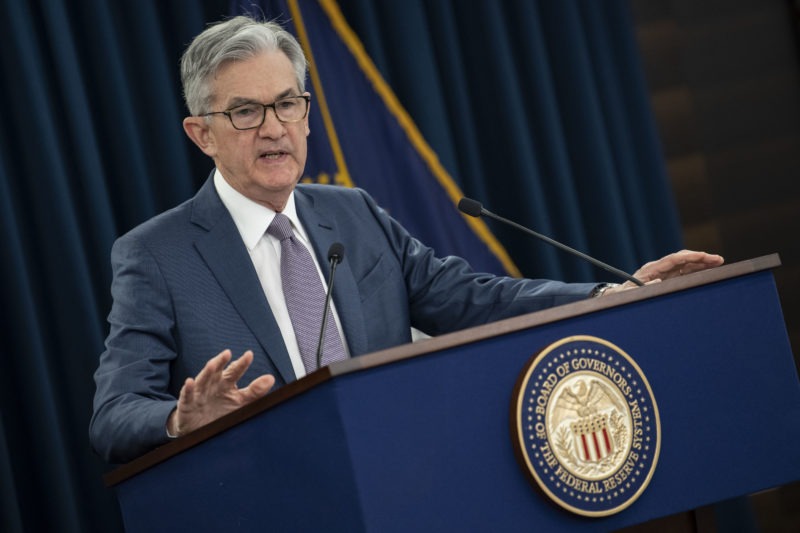US Fed leads charge against economic hit from coronavirus
US Federal Reserve Chairman Jerome Powell denied the central bank was bowing to political pressure in the aggressive emergency interest rate cut (Eric BARADAT)
Washington (AFP) – The US Federal Reserve led the charge in the global response to the growing economic risk posed by the coronavirus, announcing an emergency interest rate cut Tuesday to boost confidence.
That gave President Donald Trump the stimulus he has been calling for, but he was not satisfied and demanded even more.
But many economists worry the aggressive move goes too far and, rather than calm fears, could unsettle investors worldwide if they view it as a sign the US central bank expects a recession.
In a unanimous decision, the Fed’s policy-setting committee slashed its key interest rate by a half point to a range of 1.0-1.25 — the first inter-meeting cut since late 2008 at the height of the global financial crisis.
The large, highly unusual move made just 15 days before the next scheduled policy meeting reflected growing concerns that the spreading virus will take a bite out of the US and global economies as supply chains linked to China, the epicenter of the outbreak, are shut down.
“My colleagues and I took this action to help the US economy keep strong in the face of new risks to the economic outlook,” Fed Chair Jerome Powell told reporters of the decision.
While Powell said the US economy remains on solid footing with a strong labor market supporting household spending, but the broader spread of the virus is disrupting economic activity and “the risks to the US outlook have changed materially.”
But the Fed chief acknowledged it is too soon to know how persistent and severe the impact will be.
Though he said cutting interest rates does nothing to fix the broken supply chain, “we do believe that our action will provide a meaningful boost to the economy… and will help boost household and business confidence.”
The cut was not enough for Trump, who demanded the central bank “further ease and, most importantly, come into line with other countries/competitors.”
“We are not playing on a level field. Not fair to USA. It is finally time for the Federal Reserve to LEAD. More easing and cutting!” Trump tweeted.
– International coordination –
Powell once again denied the central bank is bowing to political pressures, saying “we make our decisions in the interests of the American people” based on “the best analysis and research.”
Companies worldwide have been buffeted by actions taken by governments to stem the outbreak of coronavirus infections since they emerged in China, where entire cities have been locked down and factories shut.
Fears that the crisis will deepen sent global equity markets into a tailspin last week, though indices have recovered this week on expectations that officials would take action.
The outbreak has now killed more than 3,100 people and infected over 90,000 as it spreads around the world.
The Fed decision came just hours after the Group of Seven finance ministers and central bankers pledged to take action using “all appropriate policy tools” to respond to the virus.
Powell said every central bank must do what it thinks best for its own economy but added that “it’s possible there will be some more formal coordination as we move forward.”
– Too much or just right? –
Wall Street gyrated Tuesday, recovering after the Fed’s announcement before heading back into the red, as many economists questioned the wisdom and effectiveness of an aggressive move.
“I’m not really sure what 50 basis points is going to do for the economy,” said Peter Cardillo of Spartan Capital Securities. “I suspect that it sends the wrong message to the market.”
And Cardillo told AFP he suspects “a political factor” was involved, despite Powell’s denials.
Patrick O’Hare of Briefing.com was among those who worry that in addition to being ineffective, the strong Fed move will spook markets.
“It could ultimately erode market psychology because when you act that quickly, that aggressively in that short amount of time, it does raise a concern that things are going to get potentially must worse than what was presumed.”
Most of the world’s advanced economies — Britain, Canada, France, Germany, Italy, Japan and the United States — have very low or negative interest rates, so the Fed was perhaps best-placed to make a move.
But monetary policy takes at least six months to have an impact on the real economy, by which point the epidemic may have passed.
“It was clearly agreed that central banks, at the very least, would take the lead in cutting rates: Australia cut today, Malaysia cut today, New Zealand and Indonesia yesterday, the Bank of Japan has sent some encouraging signs out there,” Karl Haeling of LBBW told AFP.
Disclaimer: Validity of the above story is for 7 Days from original date of publishing. Source: AFP.


